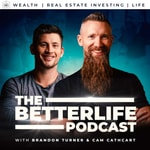Financial Planning For Canadian Business Owners – Details, episodes & analysis
Podcast details
Technical and general information from the podcast's RSS feed.

Financial Planning For Canadian Business Owners
Jason Pereira
Frequency: 1 episode/15d. Total Eps: 136

Business owners live complex lives. You have traded the stability of working for someone else, for the uncertainty of controlling our own destiny. Whether you are starting your own business, scaling it, or planning your exit, you face challenges that the average person never has to face. Ensuring that you make the most of your business means not just being the best at what you do, but figuring out all the other complexities that come with it, and that will mean finding people that will help give you the right advice.
The Financial Planning for Business Owners Podcast is here to help guide you regardless of the stage of your business. Each week we interview experts from various fields to help you become aware of what good advice looks like. From setting up your corporate structure to selling your business we tackle both the technical and personal considerations impacting all of your decisions. We can’t make you better at what you do, but we can help you benefit the most from the fruits of your labours.
Hosted on Acast. See acast.com/privacy for more information.
Recent rankings
Latest chart positions across Apple Podcasts and Spotify rankings.
Apple Podcasts
🇨🇦 Canada - entrepreneurship
02/08/2025#75🇨🇦 Canada - entrepreneurship
01/08/2025#88🇨🇦 Canada - entrepreneurship
31/07/2025#58🇨🇦 Canada - entrepreneurship
30/07/2025#59🇨🇦 Canada - entrepreneurship
29/07/2025#53🇨🇦 Canada - entrepreneurship
19/07/2025#88🇨🇦 Canada - entrepreneurship
18/07/2025#53🇨🇦 Canada - entrepreneurship
17/07/2025#30🇨🇦 Canada - entrepreneurship
15/07/2025#58🇨🇦 Canada - entrepreneurship
30/06/2025#74
Spotify
No recent rankings available
Shared links between episodes and podcasts
Links found in episode descriptions and other podcasts that share them.
See all- https://www.calm.com/
327 shares
- https://www.strategiccoach.com/
115 shares
- https://www.butlermortgage.ca/
49 shares
RSS feed quality and score
Technical evaluation of the podcast's RSS feed quality and structure.
See allScore global : 73%
Publication history
Monthly episode publishing history over the past years.
The Soul of Wealth with Dr. Daniel Crosby | E121
Episode 121
jeudi 6 février 2025 • Duration 49:16
Hosted on Acast. See acast.com/privacy for more information.
Employee Ownership Trusts Revisited with Jon Shell | E120
Episode 120
jeudi 4 juillet 2024 • Duration 32:17
In this episode, Jason talks to Jon Shell about the advent of employee ownership trusts in Canada, a game-changing legislation that addresses previous concerns and paves the way for a more inclusive and equitable business ownership structure. Through a deep dive into the intricacies of this model, listeners are offered a comprehensive understanding of its benefits, implications, and transformative potential for both business owners and employees alike.
Episode Highlights:
- 00:51: Jon shares his enthusiasm for being back on the podcast, reinforcing the collaborative nature of the conversation and evidencing the ongoing dialogue within the financial community on employee ownership.
- 00:57: Jon Shell discusses the context of the budget that introduced employee ownership trusts, identifying it as a standout positive in a predominantly negative financial announcement. His perspective sets the stage for an exploration of how this model can change the future of business ownership in Canada.
- 01:12: Shell provides a background on his role at Social Capital Partners, highlighting the organization's mission to democratize asset ownership and its focused efforts on advancing employee ownership as a vehicle for social and economic equity.
- 05:46: Tax incentives associated with employee ownership trusts are explored, providing clarity on the fiscal advantages for selling business owners, including significant capital gains tax exemptions.
- 06:11: The conversation shifts to the legislative nuances of employee ownership trusts and the substantial economic and societal benefits these structures offer, fostering job creation, economic resilience, and employee welfare.
- 08:18: Details on the specific rights and benefits that employees gain through participating in an employee ownership trust are outlined, offering insights into how this model promotes financial inclusion and workplace democracy.
- 12:12: The episode concludes with a forward-looking discussion on the potential expansion and long-term impact of employee ownership trusts in Canada, indicating a bright future for this innovative business model.
Key Takeaways:
- Employee ownership trusts offer a transformative model for business succession, aligning economic incentives with social benefits. - Tax incentives for business owners, including a substantial capital gains tax exemption, make this an attractive option for ensuring legacy and employee welfare.
- Employees gain not just from financial participation in the success of their company but also from having a voice in its governance, promoting a more democratic and equitable workplace.
- The introduction of employee ownership trusts represents a significant shift towards more inclusive capitalism, with potential long-term benefits for the Canadian economy and society.
Tweetable Quotes:
- "Employee ownership trusts redefine business legacy and inclusivity."
- "The transformative power of employee ownership trusts aligns profit with purpose."
- "Economic resilience is built on the foundation of employee ownership."
Resources Mentioned:
- Facebook – Jason Pereira's Facebook
- LinkedIn – Jason Pereira's LinkedIn
- Woodgate.com – Sponsor
- Podcast Editing
- https://www.socialcapitalpartners.ca/ https://www.linkedin.com/in/jon-shell-8952491/
Hosted on Acast. See acast.com/privacy for more information.
2024 Compensation Planning with Luc Lapalme | E111
Episode 111
jeudi 12 octobre 2023 • Duration 23:25
Jason talks to Luc Lapalme, Senior Principal at Mercer. It is a very large consulting company that consults on various aspects of business. Today he will be discussing about their compensation planning survey, and this is a survey about employers and what they are looking to accomplish or what they are looking to do when it comes to salaries for staff in the coming year.
Episode Highlights:
- 01.15: Luc explains that he specializes in compensation management and advises clients on various aspects of compensation programs, including salary structures and incentive design for both executives and salaried employees.
- 04.30: Jason mentions that in recent years, there has been a realization among many that simply matching salary increases to inflation may not be sufficient, especially when inflation rates are high.
- 10.03: Luc mentions that organizations are increasingly providing off-cycle adjustments to their employees, which are not officially included in the budget forecasts. These off-cycle adjustments are often provided to employees at higher risk or those due for promotions.
- 12.06: Luc notes that certain organizations are targeting the 75th percentile of the market to ensure they are highly competitive with specific roles. This highlights the efforts being made by organizations to attract and retain talent in a rapidly evolving work environment.
- 21.48: By focusing on employee engagement and the employee experience, HR managers can enhance job satisfaction and retention, even in situations with tighter budgets, says Luc.
3 Key Points:
- Luc highlights the impact of the great resignation during the pandemic, which led to increased employee turnover and job changes. However, he notes that attrition rates have decreased, with one study showing a drop from 21% to 18%, indicating more stable employment.
- Luc provides an example of how changes in minimum wage, such as the increase in Ontario's minimum wage, can create ripple effects and competitive pressures in the labour market for more competitive pay.
- Jason shares an example from the accounting field in the US, where large accounting firms in cities like New York and Washington, DC, began recruiting talent from across the country. This resulted in some smaller to mid-sized cities experiencing reduced operations or becoming less attractive for talent acquisition due to the significantly higher salaries offered in larger cities.
Tweetable Quotes:
- “The Compensation survey is conducted annually to gather information from participating organizations. Its primary purpose is to understand the organizations' intentions regarding salary adjustments, particularly for the year 2024” - Luc.
- “The differing salary forecasts between Canada and the United States can be attributed to various socioeconomic factors.” - Luc
- “While organizations are becoming more transparent about salary bands, they are generally not disclosing specific employee salary details or bonus information due to privacy concerns.” - Luc
Resources Mentioned:
- Facebook – Jason Pereira's Facebook
- LinkedIn – Jason Pereira's LinkedIn
- https://www.linkedin.com/in/luc-lapalme-mba-96563239/?originalSubdomain=ca
- https://www.mercer.com/en-in/
Hosted on Acast. See acast.com/privacy for more information.
Outsourcing Financial Operations of Your Business with Josh Zweig | E021
Episode 21
jeudi 2 juillet 2020 • Duration 36:27
In this episode of Financial Planning for Canadian Business Owners, Jason Pereira, award-winning financial planner, university lecturer, writer, talks with Josh Zweig, CEO and Partner at LiveCA. Josh Zweig talks about the benefits of outsourcing various financial functions and work to a professional accounting firm that can do it on your behalf, supporting ongoing engagement with your clients.
Episode Highlights:
● 01:10 – Josh Zweig explains what LiveCA does.
● 01:33 – Where is LiveCA’s physical location?
● 02:56 – How does their business model enable clients with their offerings?
● 05:05 – What is the best practice for efficiency?
● 09:07 – How often does LiveCA reengineer a client’s system?
● 12:13 – What is the first thing someone should contemplate when looking to potential outsource?
● 18:05 – Set up your system to scale.
● 21:09 – How does the pay-per-use business model change the relationship with consumers?
● 25:05 – Ask customers about their personal lives to be able to advise them better for needs that they may have never thought of.
● 26:53 – What should you look for in an outsource firm?
● 30:55 – How has LIveCA been able to help businesses during COVID-19?
3 Key Points
1. LiveCA has an account’s payable team, a payroll team, a bookkeeping team, and all of those teams work with their tech teams and their client service teams.
2. Outsourcing should serve as being a fraction of a full-time person.
3. LiveCA takes into account how fast a business is growing and they lay processes that are adaptable to even when that business hires more people.
Tweetable Quotes:
● “LiveCA is Canada’s largest online CPA firm and what we do is a combination of the tax and accounting that you would expect a typical CPA to do and we combine that with a knowledge of technology and financial workflow.” – Josh Zweig
● “Scoping is basically us going, can we help you? If so, here is what help looks like and finally, here is how much it costs.” – Josh Zweig
● “I would look at the outsourcing process as two-fold. One is, how are you doing the process? And two, who is doing it?” – Josh Zweig
Resources Mentioned:
● Facebook – Jason Pereira’s Facebook
● LinkedIn – Jason Pereira’s LinkedIn
● FintechImpact.co – Website for Fintech Impact
● jasonpereira.ca – Jason Pereira Website
● Linkedin – Josh Zwaig
● liveca.ca – Website for LiveCA
● josh@liveca.ca – Josh Zwaig Email
Hosted on Acast. See acast.com/privacy for more information.
Valuing Your Business With Melanie Russell | E020
Episode 20
jeudi 25 juin 2020 • Duration 28:34
In this episode of Financial Planning for Canadian Business Owners, Jason Pereira, award-winning financial planner, university lecturer, writer, talks with Melanie Russell, President of Kalex Valuations. Melanie Russell, is a business evaluator who does so to meet the needs of businesses for a range of issues like MNA and family law issues.
Episode Highlights:
● 01:16 – Melanie Russell, explains what he does for a living.
● 03:18 – What does the process of valuation look like?
● 04:56 – What types of metrics does she use to come up with a number?
● 07:00 – Valuation is ultimately a finance-driven study.
● 10:07 – How is valuation looked at differently by different roles that people play?
● 12:13 – What are some of the key factors that add to high valuations?
● 15:00 – How much education or push-back does she get when dealing with valuations?
● 16:32 – How does she go about normalizing expenses back into the cash flow?
● 19:26 – How much does sweat equity create push back during the valuation process?
● 23:36 – Melanie Russell discusses tax planning and estate freezes.
3 Key Points
1. Cash flow is generally what drives investors.
2. Liquidity is one the biggest difference between private company valuations and public company valuations.
3. Currently, the trend appears to be more capital-based sophisticated purchases versus just strategic ones.
Tweetable Quotes:
● “I am by background a legacy CA, CPA that specializes in the area of valuations.” – Melanie Russell
● “Valuations are business assets that are used for various purposes, whether it’s trying to sell as business, whether it is trying to transition to the next generation or to employees, whether it is a dispute.” – Melanie Russell
● “My value add is telling business owners or asset owners what someone might pay based on logical, rational thinking.” – Melanie Russell
Resources Mentioned:
● Facebook – Jason Pereira’s Facebook
● LinkedIn – Jason Pereira’s LinkedIn
● FintechImpact.co – Website for Fintech Impact
● jasonpereira.ca – Website
● Linkedin – Melanie Russell
● Kalexvaluations.com – Website for Kalex Valuations
● Linkedin – Melanie Russell’s Phone Number: (416) 488-9590 Ext. 225
● Melanie@Kalexvaluations.com – Melanie Russell’s Email
Hosted on Acast. See acast.com/privacy for more information.
Tracking Shares with Jonah Mayles | E019
Episode 19
jeudi 18 juin 2020 • Duration 26:52
In this episode of Financial Planning for Canadian Business Owners, Jason Pereira, award-winning financial planner, university lecturer, writer, talks with Jonah Mayles, Partner, Tax and Estate Planning at Sterling Park Financial. Jonah Mayles shares his wisdom derived in the field of tax law as well as insurance, and the often overlooked topic of insurance tracking shares in reference to estate planning.
Episode Highlights:
● 01:16 – Jonah Mayles explains what he does for a living.
● 02:14 – What is the concept of insurance tracking shares?
● 03:11 – What are the benefits of insurance tracking shares?
● 11:00 – How does the tax implication math happen upon death?
● 13:10 – Can beneficiary children buy shares directly from the estate?
● 14:07 – They discuss how taxes will be affected by COVID-19.
● 15:00 – What does the CRA speak to in reference to insurance tracking shares?
● 16:32 – Has Jonah seen financial arrangements where clients have borrowed from the policy as well?
● 19:17 – Jonah Mayles shares various use cases that solve several customer dynamics.
● 22:36 – The two types of lawyers that will always be busy: family lawyers and estate litigators.
3 Key Points
1. The cash surrender value of the policy contributes to the value of the fair market value of your shares.
2. We are headed towards the biggest wealth transfer in history with the Baby Boomer generation dying off.
3. Insurance is not only great for the client, but the government also gets to receive their money way faster.
Tweetable Quotes:
● “What I do at Sterling Park, my partners are all insurance guys, been in insurance their entire careers, whereas what I do is the tax and estate planning that goes into the insurance plans that we implement for our clients.” – Jonah Mayles
● “Insurance tracking shares is essentially a class of tracking shares that is created for a corporation that is going to acquire a whole life insurance policy.” – Jonah Mayles
● (Insurance tracking shares) “What it does is it tracks the value of either the cash surrender value of the policy or the death benefit, or both.” – Jonah Mayles
Resources Mentioned:
● Facebook – Jason Pereira’s Facebook
● LinkedIn – Jason Pereira’s LinkedIn
● FintechImpact.co – Website for Fintech Impact
● jasonpereira.ca – Website
● Linkedin – Jonah Mayles
● SterlingParkGrp.com – Website for Sterling Park Financial Group
Hosted on Acast. See acast.com/privacy for more information.
HR Tips and Best Practices with Kevin Kliman | E018
Episode 18
jeudi 11 juin 2020 • Duration 40:58
In this episode of Financial Planning for Canadian Business Owners, Jason Pereira, award-winning financial planner, university lecturer, writer, talks with Kevin Kliman, Co-Founder and Co-CEO of Humi. Humi is an online platform for managing basically everything that has to do with people in your business. Kevin Kliman talks about HR advice, strategies, and pitfalls to avoid for human resources in its relationship to financial planning.
Episode Highlights:
● 01:32 – Kevin Kliman explains what Humi is and the work he does with them.
● 03:24 – What does hiring people and turnover cost people aside from their salaries?
● 11:09 – What are some best practices around onboarding that really work effectively and have an impact?
● 13:21 – Kevin talks about the consequences of not having paperwork taken care of properly.
● 15:14 – What should employees be doing to address onboarding concerns?
● 17:22 – Kevin discusses firing people, dismissal and the risks surrounding that.
● 21:29 – When it comes to payroll, remove all the friction.
● 25:34 – What are some best practices for onboarding and maintenance of the plans in
general?
● 38:41 – Trust is earned.
● 39:17 – Kevin Kliman shares his final thoughts
3 Key Points
1. When hiring, make sure you are filtering for company culture fit, use recruiting
to signal to them what your expectations are, and be authentic.
2. Build an emotional bond between new employees and the rest of the team.
3. The Employment Standards Act (ESA) is the bare minimum for companies as
to how they have to treat employees.
Tweetable Quotes:
● “Humi is a cloud-based employee system of record for Canadian businesses with 5 to 500 people. It’s kind of a fancy way of saying that we combine payroll, HR, health benefits into a single simple system, cloud-based system that can be accessed from any device.” – Kevin Kliman
● (Humi) “We are really replacing paper contracts, Excel spreadsheets, all the multiple siloed systems that people use to manage the people side of their business.” – Kevin Kliman
● (Humi) “The company is four and a half years old. There are now over 1000 companies that are on Humi and they employ over 30,000 people.” – Kevin Kliman
Resources Mentioned:
● Facebook – Jason Pereira’s Facebook
● LinkedIn – Jason Pereira’s LinkedIn
● FintechImpact.co – Website for Fintech Impact
● jasonpereira.ca – Website
● Linkedin – Kevin Kliman’s Linkedin
● Twitter – Kevin Kliman’s Twitter
● Humi.ca – Website for Humi
● Kevin@Humi.ca – Email Kevin Kliman
Hosted on Acast. See acast.com/privacy for more information.
CFIB And Why You Should Join With Ryan Mallough | E017
Episode 17
jeudi 4 juin 2020 • Duration 32:30
In this episode of Financial Planning for Canadian Business Owners, Jason Pereira, award-winning financial planner, university lecturer, writer, talks with Ryan Mallough, Director of Provincial Affairs for Ontario at the Canadian Federation of Independent Business. CFIB is the largest advocacy group for small business owners in Canada. Ryan Mallough talks about what CFIB does and why small business owners should consider becoming members.
Episode Highlights:
● 01:13 – Ryan Mallough explains what CFIB does.
● 04:33 – What have been some of CFIB’s big wins in the past?
● 11:09 – Aside from COVID-19, what are some of CFIB’s other big advocacy issues currently?
● 13:21 – They talk about how construction can infringe on businesses.
● 17:30 – How have they lobbied for businesses affected by COVID-19?
● 21:28 – What has been the feedback on commercial real estate subsidies?
● 26:44 – What else does CFIB offer it’s members?
● 29:16 – What does it cost to join CFIB?
3 Key Points
1. CFIB is informed by their 110,000 members’ opinions through regular surveys and mandate questions.
2. Right now in Canada, it is easier and more lucrative from a tax perspective to sell to a third party than it is to sell to a family member.
3. CFIB has been pushing for all Canadian governments across the country to start building in construction mitigation programs, including financial compensation for businesses that are disrupted by huge construction projects.
Tweetable Quotes:
● “The Canadian Federation of Independent Business has been around for 49 years now and we represent the big voice for small businesses. We operate across the country. We have offices in all 10 provinces.” – Ryan Mallough
● “We advocate for things that small businesses are looking for. So, things like reduced small business or corporate tax rates, changes to employment standards law, cutting red tape and regulations, permit signage, that sort of thing.” – Ryan Mallough
● “How can we help the business owners succeed? How can we make their lives easier when it comes to dealing with the government, while at the same time ensuring that the government understands the realities of running a small business?” – Ryan Mallough
Resources Mentioned:
● Facebook – Jason Pereira’s Facebook
● LinkedIn – Jason Pereira’s LinkedIn
● FintechImpact.co – Website for Fintech Impact
● jasonpereira.ca – Website
● Linkedin – Ryan Mallough’s Linkedin
● CFIB.ca – Website for Canadian Federation of Independent Business
Hosted on Acast. See acast.com/privacy for more information.
Tax Implications for Americans Living In Canada with Terry Ritchie | E016
Episode 16
jeudi 28 mai 2020 • Duration 50:27
In this episode of Financial Planning for Canadian Business Owners, Jason Pereira, award-winning financial planner, university lecturer, writer, talks with Terry Richie, Partner and Vice President at Cardinal Point Wealth Management. Cardinal Point is a firm that specializes in dealing with U.S./Canadian cross-border issues. Terry Ritchie discusses tricks and traps that Canadian business owners are exposed to when they are also United States tax residents.
Episode Highlights:
● 01:02 – Terry Ritchie describes what he does in his career.
● 02:44 – What are U.S. residents for income tax purposes?
● 05:57 – COVID-19 is affecting ‘snowbirds’ from a tax prospective who can’t travel.
● 08:42 – You could have zero assets in the U.S. and a U.S. resident living in Canada. But you still have to file your taxes in the United States.
● 10:10 – Terry Ritchie addresses gift taxes
● 12:05 – What are the potential penalties for not filing income taxes?
● 17:38 – If you have interest in Canadian company, what IRS forms need to be filed?
● 19:22 – What were some of the tax changes when Trump became president?
● 21:05 – Terry shares the come advice for American clients setting up a business in Canada.
● 22:29 – What are the differences in homeowner taxes in the US and Canada?
● 26:26 – Which business industries does it make sense to get incorporated?
● 28:27 – What are your filing requirements for a corporation?
● 30:20 – What is one of the big detriments to being an American taxpayer when you are a Canadian business owner?
● 34:32 – Terry discusses the reasons why it is important to become compliant.
● 41:50 – How will passports be affected by tax debt?
● 42:52 – What is the difference between having a green card or when you are actually considered a citizen?
3 Key Points
1. There are 9 million Americans that live outside of the United States and just below 1 million Americans that live in Canada.
2. U.S. residents for income tax purposes are citizens of the U.S. that were born there, those that hold green cards, traditional ‘snowbirds’ who consistently spend generally at least 4 months in the United States for 3 years in a row.
3. Income that you leave in a foreign entity is taxed at the highest margin rate for U.S. tax purposes.
Tweetable Quotes:
● “‘We’re not just book smart, we live it.’ So, I live in Phoenix and Calgary. We have offices in California, Florida, Phoenix, Toronto, and Calgary. All my kids are dual citizens. I’m married to a U.S. citizen.” – Terry Ritchie
● “In the U.S., generally more than 90% of the companies in the U.S. are all flow-throughs, tax corporations, S-Corps, LLCs.” – Terry Ritchie
● “Sometimes, when you make them aware of the way that we tax in the US on the Canadian side, it sometimes it makes sense to just be a sole prop, and just file a good old C-2125 and a scheduled C.” – Terry Ritchie
Resources Mentioned:
● Facebook – Jason Pereira’s Facebook
● LinkedIn – Jason Pereira’s LinkedIn
● FintechImpact.co – Website for Fintech Impact
● jasonpereira.ca – Website
● Linkedin – Terry Ritchie’s Linkedin
● Terry@cardinalpointwealth.com – Email Terry Ritchie
● Linkedin – Terry Ritchie’s Linkedin
● cardinalpointwealth.com – Website for Cardinal Point Wealth Management
Hosted on Acast. See acast.com/privacy for more information.
Creditor Protection & Insolvency with Scott Terrio | E015
Episode 15
jeudi 21 mai 2020 • Duration 34:27
In this episode of Financial Planning for Canadian Business Owners, Jason Pereira, award-winning financial planner, university lecturer, writer, talks with Scott Terrio, Manager of Consumer Insolvency at Hoyes Michalos. Hoyes Michalos is a Toronto-based license and insolvency trustee. Scott Terrio talks about what insolvency means, what the options are, and how business owners can protect their assets in the event of insolvency.
Episode Highlights:
● 01:15 – Scott Terrio explains the work that he does.
● 02:55 – What is the process and options for when people get into debt issues?
● 04:18 – What are consumer proposals?
● 06:50 – How are consumer proposals different from bankruptcies to the consumer?
● 10:30 – Business debt is quite different from consumer debt.
● 13:33 – Can a spouse become liable for their other spouse’s debt?
● 14:57 – How much back and forth typically happens with consumer proposals?
● 17:07 – What is normally the timeline differences between consumer proposals and bankruptcy?
● 19:36 – What if someone goes through a consumer proposal and gets in financial trouble again?
● 21:08 – What are the misconceptions about bankruptcy in Canada?
● 24:25 – Which types of assets do creditors not have access to?
● 27:37 – Consumer debt usually costs you more over time.
● 28:38 – What do RESPs, TFSAs, RDSPs look like in a credit situation?
● 30:23 – Which bankruptcy programs are relevant to this COVID-19 moment?
3 Key Points
1. Hoyes Michalos is a Toronto-based license and insolvency trustee firm with 25 offices across Ontario, Canada and did about 5800 files last year.
2. Consumer proposals are for individuals, not a business, with $250,000 in unsecured debt or less, and are making an agreement to pay a percentage of your debt.
3. About 70% of consumer proposals go through as offered and about 99.9% co ahead with a counter-offer.
Tweetable Quotes:
● “Sooner is always better when you are talking about debt. Most small business owners, once they’ve gotten into a little bit of trouble, whether it is tax debt or supplier debt or bank debt, they keep digging.” – Scott Terrio
● “What a proposal actually is, is you are making a legal settlement with all of your unsecured creditors as a group, through a trustee, through the courts.” – Scott Terrio
● “You file a bankruptcy, you get an R9 rating for 6 years after your bankruptcy discharge. So, that is either 9 months or 21. The R9 isn’t as bad as people think, because I’ve had all kinds of people get mortgages.” – Scott Terrio
Resources Mentioned:
● Facebook – Jason Pereira’s Facebook
● LinkedIn – Jason Pereira’s LinkedIn
● FintechImpact.co – Website for Fintech Impact
● jasonpereira.ca – Website
● sterrio@hoyes.com – Email Scott Terrio
● Linkedin – Scott Terrio’s Linkedin
● Twitter – Scott Terrio’s Twitter
● hoyes.com – Website for Hoyes Michalos
Hosted on Acast. See acast.com/privacy for more information.









